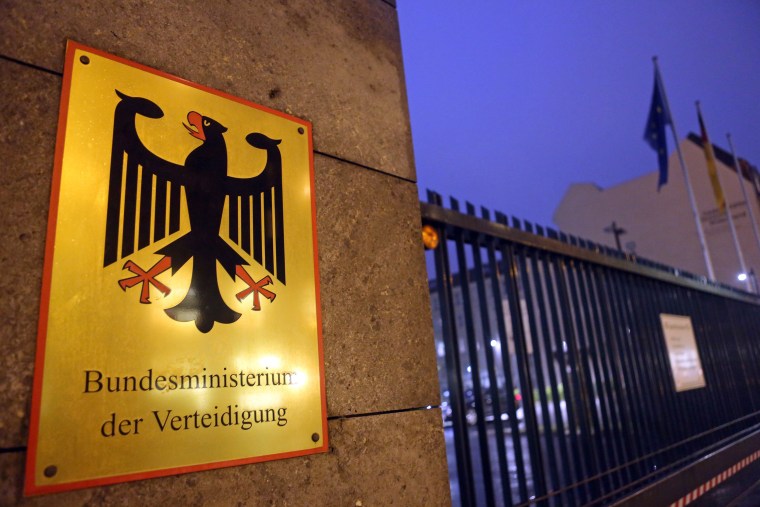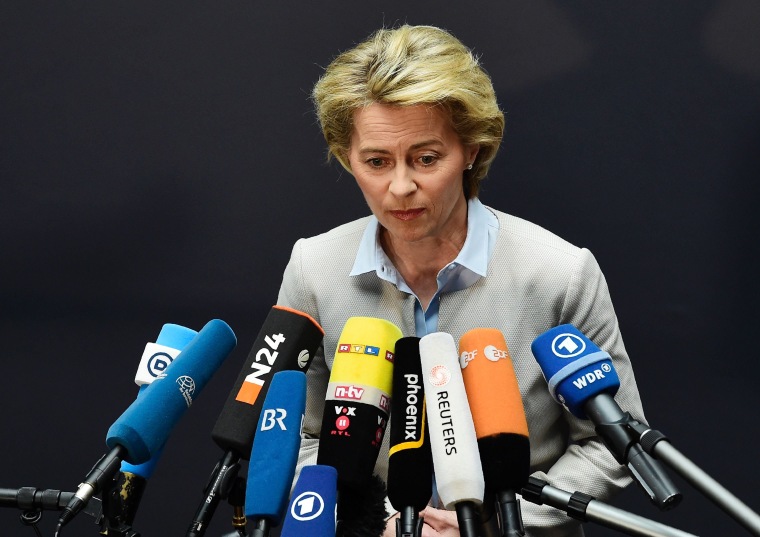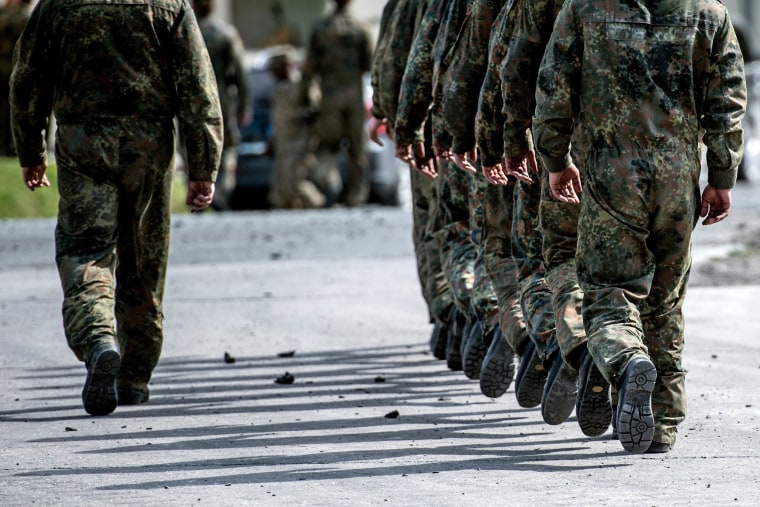The case of two German soldiers accused of plotting terrorist attacks — and even creating a false identity so they could blame a non-existent refugee — has resurfaced awkward questions about the country's Nazi legacy.
The government has promised to reform its armed forces amid a growing series of scandals showing links between members serving in the Bundeswehr and the far-right.
The crackdown includes all military facilities being searched after Nazi-era helmets, pistols and military decorations were reportedly discovered in a display case at a barracks.
Memorabilia from the Wehrmacht, the army which served Adolf Hitler, along with Nazi symbols are banned by the military.
In an extraordinary case that has captivated local media, a 28-year-old German lieutenant has been arrested after registering as a Syrian asylum-seeker for the sole purpose of conducting a terror attack under that alias.
Identified by prosecutors only as Franco A., the army officer who was attending an elite military college in France successfully negotiated an asylum hearing and even started receiving financial aid.

Authorities allege he was hoping to stoke anti-immigrant sentiment through an attack, which allegedly centered on an assassination attempt of a high-profile individual.
Investigators said they found a list of potential targets that included one of the country’s former presidents and its current justice minister.
They were targeted because they were “supportive of what the accused saw as the failed immigration and refugee affairs policies," according to prosecutors.
The suspect was nabbed when he went to retrieve a non-military handgun at the Vienna airport that he'd allegedly hidden in a bathroom to use later during an attack. Another solider and a 24-year-old student accused of conspiring with the officer have also been arrested.
"There would have been an attack," Defense Minister Ursula von der Leyen said in a television interview, describing a "horror" scenario. "There would have been a weapon at the site, with fingerprints on it. We'd have put the prints in the system and have got the match of a Syrian refugee."
German authorities have since discovered Franco A. had fraudulently obtained 1,000 rounds of live ammunition from Bundeswehr stocks. A search of his barracks in France found swastikas and memorabilia from the wartime army, the Wehrmacht.
"It is difficult to believe that this is just a lone wolf"
Officials say 143 cases of suspected far-right extremism in the military were reported in 2016, with another 53 reported this year. The German military has some 178,000 active duty personnel.
A Defense Ministry report on the incidents detailed examples of soldiers performing the Nazi salute or racially abusing service members from minority backgrounds.
In one case, a soldier who was heard saying "Heil Hitler" and "Sieg Heil, comrades" was not dismissed.
Many armies have had problems weeding out far-right extremists in their ranks. But for the German army, the past makes the issue especially sensitive.
When the German armed forces were refounded after World War Two, they disavowed any link to the Wehrmacht, which was complicit in many Nazi atrocities. Set up in 1955, the new Bundeswehr was to be a democratic body of "citizen soldiers" with the autonomy and confidence to reject immoral orders. However, some links remained: Wehrmacht officers rejoined the Bundeswehr and until today some military bases are still named after Wehrmacht soldiers.
Franco A. wrote a master's thesis that included far-right and xenophobic ideas. However, while the German military knew about it, they never fully investigated him.
"When his master's thesis says that immigration leads to the genetic genocide of Western peoples, then it should be crystal clear to everyone that we are dealing with Nazi ideas," von der Leyen said in a speech to German top brass last week.

Germany has seen the arrival of hundreds of thousands of asylum-seekers — many of them fleeing war and persecution in the Middle East. It also has tightened vetting procedures following a series of violent attacks in Germany and neighboring countries that were carried out by registered refugees.
On Wednesday, the defense minister vowed to make significant changes.
"We, in the Bundeswehr, have to look inwards and ask ourselves ... how the incidents that we are discussing were still able to happen," von der Leyen said. “How did the internal leadership in these cases break down? For us, it is above all about looking forward. What can we do now?"
Von der Leyen has found herself under pressure after it was perceived that she had criticized the entire armed forces over the case of Franco A., suggesting there was a “misunderstood esprit de corps” and that some officers had “looked the other way.”
She subsequently promised "appropriate measures and all firmness" not only in the cases of far-right extremism but also "cases of sexual degradation of soldiers, both male and female."

Tobias Lindner, a lawmaker with the opposition Green Party and a member of German Parliament's defense committee, told NBC News that many unanswered questions remained.
"Why did it take the case of Franco A. to investigate the problem of right-wing extremism among members of the armed forces?" Lindner asked. "It is difficult to believe that this is just a lone wolf. I wouldn't be surprised if more will come to light."
The politician said the German military should invest more in leadership training and the political education of its soldiers, adding that more needs to be done to scrutinize applicants.
"Each right-wing extremist is one too many," Lindner added.
Col. Boris Nannt, a spokesman for the German Defense Ministry, told reporters Wednesday that there was no indication that a wider network was involved in the Franco A. case. However, he confirmed that the investigation is ongoing.
Nick Bailey reported from London. Carlo Angerer reported from Mainz, Germany.

